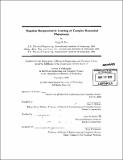Bayesian nonparametric learning of complex dynamical phenomena
Author(s)
Fox, Emily Beth
DownloadFull printable version (31.30Mb)
Other Contributors
Massachusetts Institute of Technology. Dept. of Electrical Engineering and Computer Science.
Advisor
Alan S. Willsky and John W. Fisher, III.
Terms of use
Metadata
Show full item recordAbstract
The complexity of many dynamical phenomena precludes the use of linear models for which exact analytic techniques are available. However, inference on standard nonlinear models quickly becomes intractable. In some cases, Markov switching processes, with switches between a set of simpler models, are employed to describe the observed dynamics. Such models typically rely on pre-specifying the number of Markov modes. In this thesis, we instead take a Bayesian nonparametric approach in defining a prior on the model parameters that allows for flexibility in the complexity of the learned model and for development of efficient inference algorithms. We start by considering dynamical phenomena that can be well-modeled as a hidden discrete Markov process, but in which there is uncertainty about the cardinality of the state space. The standard finite state hidden Markov model (HMM) has been widely applied in speech recognition, digital communications, and bioinformatics, amongst other fields. Through the use of the hierarchical Dirichlet process (HDP), one can examine an HMM with an unbounded number of possible states. We revisit this HDPHMM and develop a generalization of the model, the sticky HDP-HMM, that allows more robust learning of smoothly varying state dynamics through a learned bias towards self-transitions. We show that this sticky HDP-HMM not only better segments data according to the underlying state sequence, but also improves the predictive performance of the learned model. Additionally, the sticky HDP-HMM enables learning more complex, multimodal emission distributions. (cont.) We demonstrate the utility of the sticky HDP-HMM on the NIST speaker diarization database, segmenting audio files into speaker labels while simultaneously identifying the number of speakers present. Although the HDP-HMM and its sticky extension are very flexible time series models, they make a strong Markovian assumption that observations are conditionally independent given the discrete HMM state. This assumption is often insufficient for capturing the temporal dependencies of the observations in real data. To address this issue, we develop extensions of the sticky HDP-HMM for learning two classes of switching dynamical processes: the switching linear dynamical system (SLDS) and the switching vector autoregressive (SVAR) process. These conditionally linear dynamical models can describe a wide range of complex dynamical phenomena from the stochastic volatility of financial time series to the dance of honey bees, two examples we use to show the power and flexibility of our Bayesian nonparametric approach. For all of the presented models, we develop efficient Gibbs sampling algorithms employing a truncated approximation to the HDP that allows incorporation of dynamic programming techniques, greatly improving mixing rates. In many applications, one would like to discover and model dynamical behaviors which are shared among several related time series. By jointly modeling such sequences, we may more robustly estimate representative dynamic models, and also uncover interesting relationships among activities. (cont.) In the latter part of this thesis, we consider a Bayesian nonparametric approach to this problem by harnessing the beta process to allow each time series to have infinitely many potential behaviors, while encouraging sharing of behaviors amongst the time series. For this model, we develop an efficient and exact Markov chain Monte Carlo (MCMC) inference algorithm. In particular, we exploit the finite dynamical system induced by a fixed set of behaviors to efficiently compute acceptance probabilities, and reversible jump birth and death proposals to explore new behaviors. We present results on unsupervised segmentation of data from the CMU motion capture database.
Description
Thesis (Ph. D.)--Massachusetts Institute of Technology, Dept. of Electrical Engineering and Computer Science, 2009. Cataloged from PDF version of thesis. Includes bibliographical references (p. 257-270).
Date issued
2009Department
Massachusetts Institute of Technology. Department of Electrical Engineering and Computer SciencePublisher
Massachusetts Institute of Technology
Keywords
Electrical Engineering and Computer Science.